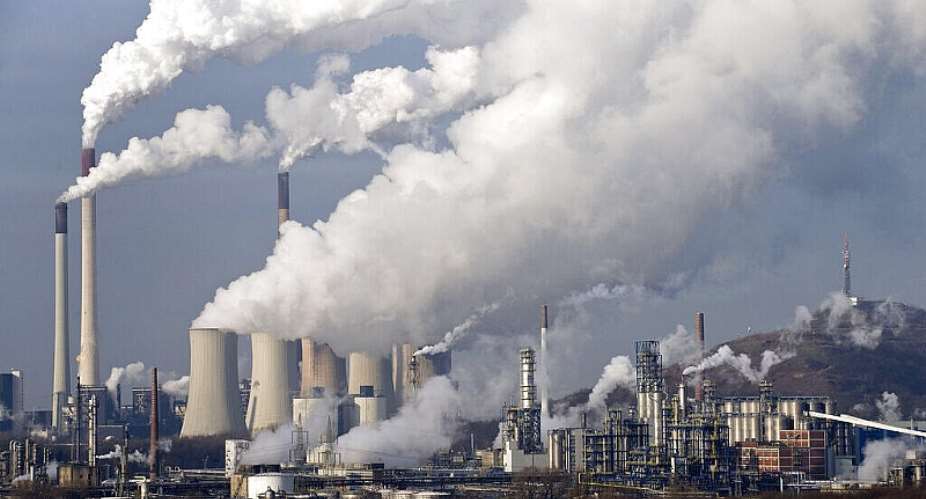Only 40 of the world's 100 largest private firms have set net-zero carbon emissions targets to fight climate change, lagging far behind public companies. This is according to a report by the Net Zero Tracker group released on Monday.
For the world to meet the 2015 Paris Agreement to limit global warming 1.5C, all companies need to reduce their planet-heating emissions, according to the report.
The lack of market and reputational pressures on private firms compared to those publicly listed, along with an absence of regulation are to blame for their slow uptake of climate commitments, John Lange of Net Zero Tracker told French newswire service AFP.
"I think things are changing on all three of those fronts," he added.
'Naked PR stunt'
The report compared 200 of the world's largest public and private companies based on their reported emissions reduction strategies and net-zero targets.
It found that only 40 of the 100 private firms assessed had net zero targets, compared to 70 of 100 publicly-listed companies.
Of the private companies that have set targets, just eight have published plans on how they will meet them.
"A pledge without a plan is not a pledge – it is a naked PR stunt," the report said.
The firms analysed account for roughly 23 percent of the global economy, with the majority based in either China, the United States or EU states – the biggest emitters of greenhouse gases.
Regulations coming
The report reveals only two firms – furnishing giant Ikea and US engineering giant Bechtel – ruled out using controversial carbon credits to achieve their net-zero goals.
Carbon credits allow businesses offset their emissions by directing money toward a project that reduces or avoids emissions, such as protecting forests – but critics say they allow companies to keep polluting.
Several jurisdictions have adopted climate disclosure regulations, while others have regulations on the horizon – business hubs of California and Singapore requiring greenhouse gas emissions reporting from 2027.
The European Union also introduced two climate regulations – the Corporate Sustainability Reporting Directive and the Corporate Sustainability Due Diligence Directive – which will soon require thousands of large companies to report their climate impacts and emissions, and to take action to curtail them.
French supermarket chain singled out
The EU policies are expected to have far-reaching effects in particular, targeting firms not only based in the bloc but those that may be headquartered elsewhere with branches or subsidiaries within the member states.
Yet two European private firms, including French hypermarket chain E. Leclerc, were singled out in the report for not having set any emission reduction targets at all.
Although E.Leclerc maintains the company has made efforts toward more sustainable practices like eliminating the use of single-use plastic bags, and is "committed to setting near-term company-wide emissions reduction targets".
But with the enforcement of EU regulations looming, firms will no longer be able to "dodge" climate targets, Sybrig Smit of the NewClimate Institute told AFP.
"It's actually quite watertight. If companies want to do business in Europe, they are going to have to face the consequences," she said.
(with AFP)





 Walewale NPP: Constituency Chairman endorsement of Tiah Mahama as PC prejudicial...
Walewale NPP: Constituency Chairman endorsement of Tiah Mahama as PC prejudicial...
 Land disputes: We must strictly enforce land tenure, administrative laws—Securit...
Land disputes: We must strictly enforce land tenure, administrative laws—Securit...
 V/R: Keta NMTC appeals for support to fix damaged auditorium
V/R: Keta NMTC appeals for support to fix damaged auditorium
 Eugene Arhin is a blessing to us — Awutu Senya DCE
Eugene Arhin is a blessing to us — Awutu Senya DCE
 Confusion in NPP Walewale
Confusion in NPP Walewale
 Chieftaincy disputes becoming national security threats — Albert Kan-Dapaah
Chieftaincy disputes becoming national security threats — Albert Kan-Dapaah
 Exchange of old cylinders for new ones under CRM to begin soon — NPA
Exchange of old cylinders for new ones under CRM to begin soon — NPA
 Cocoa Farmers Association urges Akufo-Addo to disregard allegations against COCO...
Cocoa Farmers Association urges Akufo-Addo to disregard allegations against COCO...
 WN/R: Papaase residents kick against alleged plans to mine on River Kantango
WN/R: Papaase residents kick against alleged plans to mine on River Kantango
 Ghana will not derail into political turmoil under my watch — Akufo-Addo
Ghana will not derail into political turmoil under my watch — Akufo-Addo
